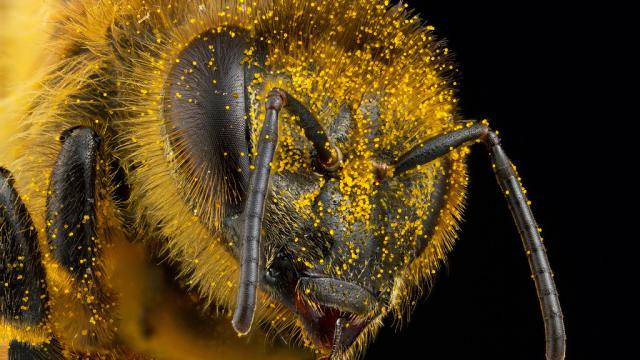With drug laws changing all the time, it’s hard for police sniffer dogs to keep up with what they’re supposed to find and what they aren’t. That’s why police forces are turning to insects to sniff out narcotics.
An odd scientific paper in PLoS One today details the very first attempts to get insects to become drug sniffers. The researchers tested three insects — the grapevine moth, the hissing cockroach and the western honeybee — just to assess how well they could differentiate the smell of one substance from another. The bees won, because their antennae make great “biosensors”, the researchers report.
Testing took place in the Police Laboratory for Criminal Technology in Hesse, Germany. The researchers explain there are a lot of reasons to use bees, and it’s not just because cannabis legalization is confusing all their dogs:
Recreational cannabis use was recently legalised in two US states and is decriminalized in many others. Therefore, a sniffer dog “alert” is no longer sufficient evidence to allow police searches without permission, a warrant, or additional probable cause. The retraining of sniffer dogs to ignore cannabis is difficult and time consuming. Trained insects have been proposed as alternative biosensors for illegal drugs because their antennae are the most sensitive natural organs discovered thus far for the detection of volatiles. Insects can be produced and reared inexpensively, and they can be conditioned rapidly to react to specific volatiles. The ability of insects to sense and learn odours varies from species to species. Therefore, protocols must be developed to screen different species for their suitability in drug-detection applications.
Elsewhere in the paper, the researchers assert that dogs are not only hard to retrain, but they bond too much with their human companions. That means the animals sometimes take cues from their humans, and that biases their findings. Insects, on the other hand, are unlikely to pick up on human biases.
Plus, bees are able to detect many different kinds of “volatiles,” or smells. Plus, they are easy to rear and apparently can be “conditioned rapidly” to respond to particular scents. Conditioning was accomplished by teaching the bees to avoid certain odours by delivering a mild electric shock to the bees while they were exposed to the scent of drugs like heroin. In a drug-sniffing situation, the researchers suggest putting 40 bees into a special “behavioural monitoring chamber” where you could watch to see if they flew in the opposite direction of a nearby scent.
The researchers end their paper by calling for much more research to be done into drug-sniffing honeybees.
It seems worth noting that it’s weird time to be using bees like this, given that honeybees have been suffering huge population collapses in recent years.
As science journalist Ivan Oransky remarked wryly:
Apparently the way to save honeybees is to turn them into…police drug sniffers http://t.co/mP1CcNDscW
— Ivan Oransky (@ivanoransky) June 18, 2015
Maybe so.
Read the full scientific study at PLoS One.
Picture: Alex Wild
